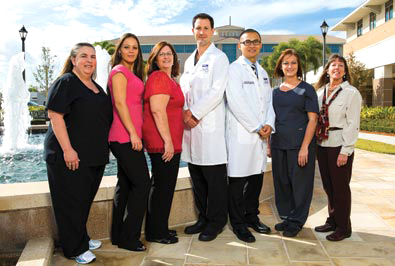Weight Loss Surgery Saving & Changing Lives
By Space Coast Medicine & Active Living // December 16, 2013
BARIATRIC SURGERY

CLICK HERE TO MEET DR. NATHAN ALLISON
CENTRAL FLORIDA, USA – Dr. Nathan Allison has led the Health First NewFit program in meeting the criteria for application as a Bariatric Center of Excellence from the American College of Surgery.
 Among the area’s most experienced bariatric surgeons, he has performed hundreds of successful bariatric surgeries. Versed in cutting-edge surgical technology and safety, Allison utilizes the da Vinci robotics-assisted surgical system.
Among the area’s most experienced bariatric surgeons, he has performed hundreds of successful bariatric surgeries. Versed in cutting-edge surgical technology and safety, Allison utilizes the da Vinci robotics-assisted surgical system.
NewFit is the only surgical weight-loss program on the Space Coast to use this less-invasive technology, which is a superior alternative to open surgery.
Significantly Improved Quality of Life
For as long as she could remember, Alexandra “Ally” L. had struggled with her weight. “Ever since I was a baby, I had weight issues,” said the 21-year-old Melbourne, Florida resident.
At her heaviest, Ally was 240 pounds, placing her among the group of more than 10 million Americans who are considered morbidly obese.
Despite her youth, her weight problems were already negatively impacting her health. She was experiencing problems with her gall bladder when she approached Dr. Nathan Allison, a general surgeon who specializes in laparoscopic, robotic and bariatric surgeries with Health First Physicians’ Group.
It turned out to be her salvation.

Allison found Ally to be a perfect candidate for bariatric surgery to control her weight. In March, during spring break from Brevard Community College, Ally underwent gastric sleeve surgery performed by Allison. The procedure went without a hitch and Ally was back in class when classes resumed.
“I didn’t even miss any school,” she said.
Now, just a few months later, Ally is down to 162 pounds. She went from size 24 to 14 and is still losing weight, helped by the exercise regimen she continues at home and at Health First Pro-Health and Fitness Center.
“I pretty much eat what I want, but my appetite is way down, she said. “I’m very glad I went through that surgery.”
Ally is one of the patients who has experienced a significantly improved quality of life through Health First’s NewFit Surgical Weight Loss program, which is led by Allison, the only fellowship-trained robotics-assisted bariatric surgeon in Brevard County.
Regaining Control
Located on the Health First Viera Hospital medical campus, NewFit encompasses a network of doctors and other healthcare professionals who focus on assisting obese patients to regain control of their bodies, health and lives. “Medication doesn’t cure obesity, it just controls it,” said Allison.
 Television shows such as “The Biggest Loser,” which provide 24/7 coaches that trim down obese contestants, present a somewhat misleading picture of the struggle severely overweight people confront to take off the pounds. “Ninety-five percent of these very obese individuals are going to fail with diet alone,” said Allison.
Television shows such as “The Biggest Loser,” which provide 24/7 coaches that trim down obese contestants, present a somewhat misleading picture of the struggle severely overweight people confront to take off the pounds. “Ninety-five percent of these very obese individuals are going to fail with diet alone,” said Allison.
“If you check back on the contestants from Season One of that show, you are going to find many of them gained the weight back.”
Bariatric operations, on the other hand, provide the best chance for long-term success, offering an alternative when nothing else works. Bariatric procedures – gastric banding, sleeve gastrectomy and gastric bypass – are not new, but the extent of need is.
“Bariatrics has just exploded,” said Allison. “Being overweight is actually becoming closer to the norm. In Brevard County, the obesity rate is 30 percent.”
 Nationally, the National Center for Health Statistics notes that two of three American adults are overweight. Duke University researchers predict that by 2030, more than 10 percent, or 32 million, of the U.S. population will be severely obese.
Nationally, the National Center for Health Statistics notes that two of three American adults are overweight. Duke University researchers predict that by 2030, more than 10 percent, or 32 million, of the U.S. population will be severely obese.
The significance of that figure bodes ill for an already challenged health-care system, since health risks associated with obesity include cardiovascular disease, diabetes, cancers, hypertension, high cholesterol, asthma, osteoarthritis and liver disease.
Treatment of obesity already accounts for more health care dollars in the United States than any other single medical problem. Being overweight ranks second only to lung cancer as the leading cause of early preventable death.
Permanent Results
Unlike “band-aid” approaches and diets, bariatric surgery helps patients achieve permanent weight loss by surgically modifying the stomach, changing eating behavior and reducing caloric consumption. The procedures reduce the stomach’s capacity to a fraction of its original size, limiting the amount of food the patient can ingest at one time, yet increasing the feeling of fullness.

“You don’t have the same hunger, so you have the sensation of being full,” said Allison.
For adults, overweight and obesity ranges are determined by using weight and height to calculate a number called the “body mass index” (BMI). BMI is used because, for most people, it correlates with their amount of body fat. An adult who has a BMI between 25 and 29.9 is considered overweight. An adult who has a BMI of 30 or higher is considered obese.
READ MORE: Obesity At Epidemic Proportions
Patients may be considered likely candidates for bariatric surgery if their body mass index is at least 40, which translates into being about 100 pounds overweight, or if they have BMIs of at least 30 combined with issues such as Type 2 diabetes, heart disease and sleep apnea.
Average weight loss after bariatric surgery is 30 to 50 percent of excess weight in the first six months and up to 77 percent as soon as a year after the surgery.
Increased Self-Confidence
In November of 2011, Allison performed gastric sleeve surgery on Cocoa resident Stanley W., who weighed 340 pounds at the time.

Since then, Stanley has lost 110 pounds and has gone from size 44 slacks to size 36.
Even more important than the increased self-confidence his new svelte self provides him, Stanley can thank the gastric sleeve for helping to wean him from the pile of pills he was taking daily for his diabetes and other medical problems.
“Now, I’m just down to one pill a day,” he said. “My blood sugar level is down to where it is supposed to be.”
Stanley had tried dieting. He would gain the weight back. He was in a downward spiral, could barely walk and suffered from high cholesterol. A friend’s success with bariatrics finally prompted him to approach Allison. He desperately wanted to lose weight.
Long-Term Commitment
Bariatrics can benefit all overweight individuals, but it is nevertheless a procedure that requires commitment from patients such as Stanley.

After bariatric surgery through the NewFit program, patients are referred to a nutritionist, psychologist and exercise physiologist who is available to help them through the journey back to health.
“It is, fundamentally, a major change,” said Allison. “This all works to ensure the patient’s optimal weight-loss success and improved long-term health.”
To encourage patients to embrace a healthier and lifelong lifestyle, all NewFit patients are waived the new membership fee to Health First Pro-Health and Fitness Center and also receive three months of free membership following surgery. Stanley has become a “gym rat” who exercises at Pro-Health three times a week. “I really like it,” he said.
“I struggled with my weight for 30 years,” said Stanley. “I’d do bariatric surgery again tomorrow. I wish I had it done years ago.”













Everyone wants to live happily for many years to come. That is very achievable for people who undergo weight loss surgery. According to a study, about 95 percent of people who have weight loss surgery performed report an improved quality of life after their procedure. If you are at a healthier weight, it’s only logical that you will likely run a lower risk for obesity-related conditions.